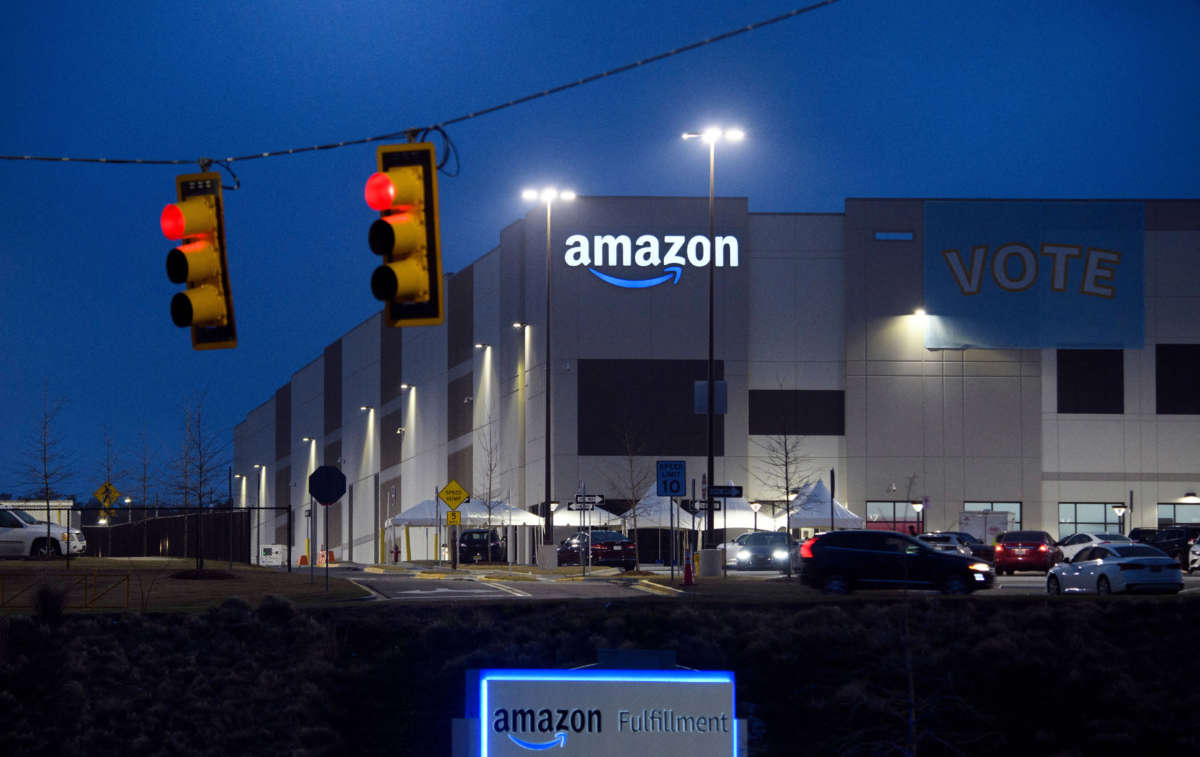Did you know that Truthout is a nonprofit and independently funded by readers like you? If you value what we do, please support our work with a donation.
Last week, the day after the 111th anniversary of the Triangle Shirtwaist Factory Fire, a mysterious, smoky gas began filling an Amazon warehouse in Bessemer, Alabama. According to the Retail, Wholesale and Department Store Union (RWDSU), workers didn’t know what the gas was; while workers on the third floor were asked to take unpaid time off and leave at around 1:30 pm Central time, people on other floors were kept working at their stations.
At around 4:30 pm, a little over an hour after workers first saw the gas on the first floor and with no word from management, workers evacuated by word of mouth, fearing that the gas was smoke or another dangerous substance, the RWDSU said.
Outside, there were only a few emergency vehicles at the roughly 850,000 square foot facility, and the workers were told to clock out. At 7 pm, with the gas still present, night shift workers were ushered in to work.
The gas was later determined to be vaporized oil from a dysfunctional compressor. It’s unclear if this could cause health issues.
“Everyone was very confused, and the lack of information made us feel very unsafe,” Amazon worker Isaiah Thomas said, expressing shock that employees were kept inside even after the third floor was evacuated. “I don’t know what I was breathing in for that long, and I don’t know if it’s still in the air at work today either. I feel very unsafe and I wish management would treat us like humans and care about our safety in a real way.”
The Amazon workers have contacted the Occupational Health and Safety Administration (OSHA) over the incident at the warehouse. The fulfillment center, known as BHM1, has been in the midst of a union campaign for nearly two years.
The company has disputed the RWDSU’s account of the incident, claiming that it evacuated workers and is paying them for their whole shift, though Amazon has lied to the public before in order to save face.
“Accidents happen, but there’s no reason why thousands of workers should have had to keep working breathing in what we thought was smoke for hours,” Thomas said. “Why is my health less important than a package getting shipped?”
The smoke filled the Amazon warehouse only one day after the anniversary of the Triangle Shirtwaist Factory fire, Thomas pointed out.
The 1911 fire at a garment factory in Manhattan is among the deadliest workplace incidents in U.S. history, killing 146 workers, most of whom were young immigrant women. The casualties were largely the fault of the factory’s owners, who regularly locked workers inside the building without access to stairs and exits; when a major fire broke out, workers were forced to jump out of windows in hopes of saving themselves.
Late last year, OSHA launched an investigation after a tornado collapsed an Amazon warehouse in Illinois, killing six people and leaving one person injured. Workers said that the deaths were partially due to unsafe policies from Amazon, which banned employees from having a cell phone on them while working.
RWDSU president Stuart Appelbaum called for better safety standards in response to the incident. “Amazon knowingly kept workers at their stations for hours during the incident, failed to properly evacuate the facility, and told workers to go back to work before any clarity on the safety of the vapor in the air was known,” Appelbaum said.
“It is unconscionable that Amazon would keep workers at their stations when there is a known health and safety issue,” he continued. “Workers’ lives should never be put in jeopardy for profits, something Amazon has an inexcusable history of doing.”
Press freedom is under attack
As Trump cracks down on political speech, independent media is increasingly necessary.
Truthout produces reporting you won’t see in the mainstream: journalism from the frontlines of global conflict, interviews with grassroots movement leaders, high-quality legal analysis and more.
Our work is possible thanks to reader support. Help Truthout catalyze change and social justice — make a tax-deductible monthly or one-time donation today.
